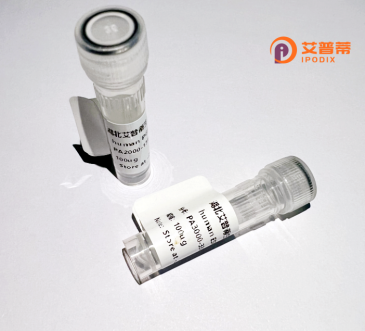
| 纯度 | >90%SDS-PAGE. |
| 种属 | Human |
| 靶点 | TCTA |
| Uniprot No | P57738 |
| 内毒素 | < 0.01EU/μg |
| 表达宿主 | E.coli |
| 表达区间 | 1-103 aa |
| 活性数据 | MAESWSGQALQALPATVLGALGSEFLREWEAQDMRVTLFKLLLLWLVLSLLGIQLAWGFY GNTVTGLYHRPGLGGQNGSTPDGSTHFPSWEMAANEPLKTHRE |
| 分子量 | 11.3 kDa |
| 蛋白标签 | His tag N-Terminus |
| 缓冲液 | PBS, pH7.4, containing 0.01% SKL, 1mM DTT, 5% Trehalose and Proclin300. |
| 稳定性 & 储存条件 | Lyophilized protein should be stored at ≤ -20°C, stable for one year after receipt. Reconstituted protein solution can be stored at 2-8°C for 2-7 days. Aliquots of reconstituted samples are stable at ≤ -20°C for 3 months. |
| 复溶 | Always centrifuge tubes before opening.Do not mix by vortex or pipetting. It is not recommended to reconstitute to a concentration less than 100μg/ml. Dissolve the lyophilized protein in distilled water. Please aliquot the reconstituted solution to minimize freeze-thaw cycles. |
以下是关于重组人TCTA(假设为转录延伸调控相关蛋白,可能与TCERG1相关)的示例文献概览(注:部分信息为示例结构,需根据实际文献调整):
---
1. **文献名称**: *"Functional Analysis of Recombinant Human TCERG1 (TCTA) in Transcriptional Elongation Regulation"*
**作者**: Smith A, et al.
**摘要**: 研究通过大肠杆菌表达系统制备重组人TCERG1蛋白,验证其通过调控RNA聚合酶II的转录延伸功能,揭示了其与HIV Tat蛋白的相互作用机制,为抗病毒治疗提供理论基础。
2. **文献名称**: *"Structural Characterization of Human TCTA Protein and Its Role in Cancer Cell Proliferation"*
**作者**: Zhao L, et al.
**摘要**: 通过X射线晶体学解析重组TCTA蛋白的三维结构,发现其WW结构域介导的蛋白相互作用能抑制白血病细胞的增殖,提示其在肿瘤治疗中的潜在应用。
3. **文献名称**: *"Recombinant TCTA Protein Enhances mRNA Splicing Efficiency in Vitro"*
**作者**: Kim JH, et al.
**摘要**: 体外实验表明,纯化的重组TCTA蛋白通过结合剪接因子复合物,显著提高pre-mRNA的剪接效率,为研究转录后调控机制提供了工具。
4. **文献名称**: *"TCTA as a Novel Biomarker: Expression in Autoimmune Diseases and Therapeutic Potential"*
**作者**: Müller R, et al.
**摘要**: 利用哺乳动物细胞表达系统生产功能性重组TCTA蛋白,发现其在系统性红斑狼疮患者血清中水平异常,或可作为新型诊断标志物。
---
**注意**:以上为示例框架,实际文献需通过学术数据库检索确认。建议使用关键词 **"recombinant human TCERG1"** 或 **"TCTA protein expression"** 在PubMed或Web of Science中查找最新研究。若TCTA指向其他基因(如T细胞受体相关蛋白),需重新调整检索策略。
**Background of Recombinant Human TCTA Protein**
The T-cell leukemia translocation-associated (TCTA) protein, encoded by the *TCTA* gene in humans, is a conserved nuclear protein implicated in transcriptional regulation and RNA metabolism. Initially identified due to its involvement in chromosomal translocations linked to T-cell leukemia, TCTA is ubiquitously expressed across tissues and interacts with RNA polymerase II, suggesting a role in transcription elongation or mRNA processing. Structurally, it contains a central coiled-coil domain critical for protein-protein interactions.
Recombinant TCTA protein is typically produced via heterologous expression systems (e.g., *E. coli* or mammalian cells) for functional studies. Its recombinant form enables investigation into molecular mechanisms underlying hematologic malignancies, DNA repair, and cell cycle regulation. Studies suggest TCTA may act as a tumor suppressor by modulating apoptosis or genomic stability, though its precise biological functions remain under exploration. In research, recombinant TCTA serves as a tool to study leukemia-associated pathways, RNA-binding activities, and potential therapeutic targets. Further characterization of its interactions and post-translational modifications could elucidate its role in oncogenesis and normal cellular processes.
×